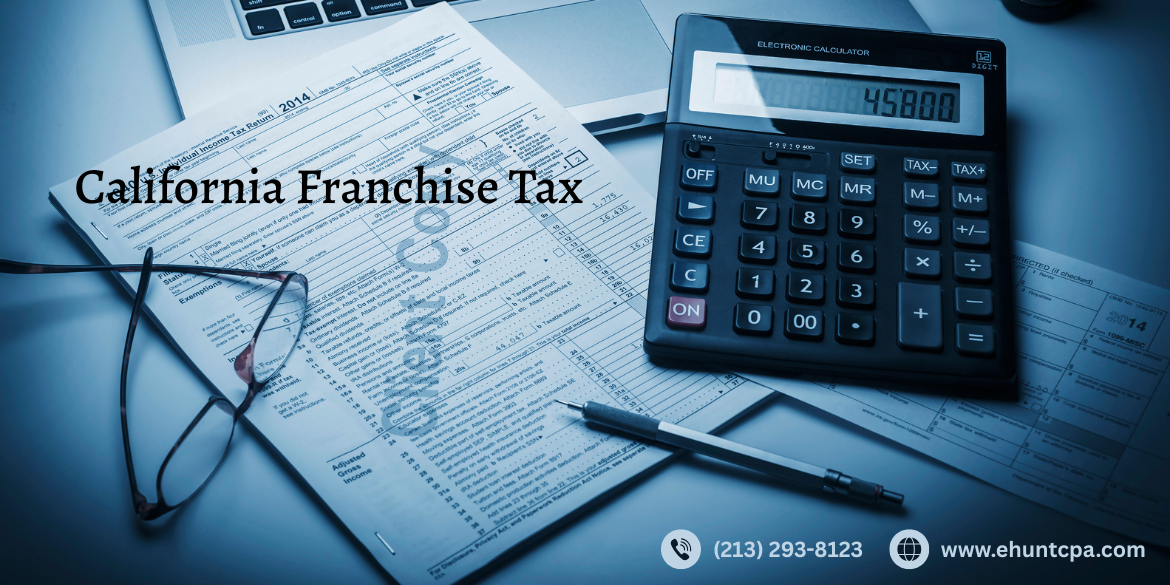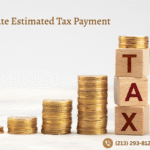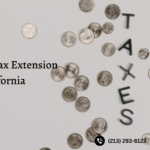
If you are a business owner in the Golden State, you are likely focused on growing your business and serving your clients. But one thing that often confuses is the California franchise tax. Whether you operate an LLC, corporation, or limited partnership, it is essential to understand and pay this tax on time to keep your business running smoothly.
At Eric M Hunt, CPA, we understand that state taxes can be confusing – that’s why we make them easier to understand for California businesses. This guide walks you through how to pay California franchise tax and also explains what it is, when it’s due, how to pay it, and what to do if you can’t or have missed a payment.
What is the California Franchise Tax? A Breakdown for LLCs and Corporations
We often hear from business owners wondering, “What is the California franchise tax?” In simple terms, it is a fee you pay to maintain your business’s legal registration and keep it active in the state of California. This fee is what companies pay to operate in California as an LLC, corporation, or other legal entity. This tax is managed by the California Franchise Tax Board (FTB). However, the minimum tax, which applies to most business entities, is often the area that confuses.
The $800 Minimum Franchise Tax: What Every Business Needs to Know
The California LLC franchise tax is simple. Every LLC and corporation needs to pay at least $800 per year. This applies even if your business operates at a loss or has no activity – as long as your business remains in good standing, the minimum tax that business owners are required to pay to the state remains unchanged. This applies to:
- California LLCs
- C Corporations
- S Corporations
- Limited Partnerships
- Limited Liability Partnerships
It is a core component of the franchise tax for LLCs that California business owners must include in their annual budget.
Beyond the $800: Understanding Gross Receipts and Net Income Tiers
While the $800 annual franchise tax applies to all active entities, certain businesses may be required to pay additional amounts. The rules and regulations vary between LLCs and corporations.
- For LLCs: Most LLCs only pay the $800 minimum annual franchise tax. But if your LLC’s total income from all sources on Schedule K-1 hits $250,000 or more, an extra fee applies on a graduated scale. This is a key detail that’s often overlooked when discussing LLC franchise tax in California.
- For Corporations (C-Corps & S-Corps): Corporations pay either the $800 minimum tax or a higher amount based on their net income – whichever is more. If you run a C-Corp, your tax rate is 8.84%, but for S-Corps, it’s just 1.5% of net income.
Key Due Dates: When is California Franchise Tax Due?
Knowing when the California franchise tax is due helps you avoid paying more in penalties and interest. The California franchise tax due date isn’t the same for every business – it depends on your business type and how old it is
First-Year California Businesses: The Exemption Rule
If you are just starting, this is important! Your first-year tax payment is due on the 15th day of the fourth month after your LLC or corporation files with the California Secretary of State.
For example, if you set up your LLC on July 10th, your first California franchise tax payment of $800 is due by November 15th of that year.
For Ongoing LLCs and Corporations: Annual Payment Deadlines
For every year following your first, the due date for the California franchise tax is consistent. The $800 minimum tax is due by the 15th day of the fourth month of your tax year – April 15th if you follow the calendar year.
Any amount over the $800 minimum, based on your net income or gross receipts, is usually due with your annual tax return on the 15th day of the third month after your tax year ends – March 15th for calendar-year corporations.
The 1st Estimate Payment: Navigating Form 100-ES for Corporations
If a corporation expects to owe $800 or more in taxes this year, it needs to make estimated payments with Form 100-ES. Estimated tax payments are generally due on the 15th day of the 4th, 6th, 9th, and 12th months of the tax year.
How to Pay California Franchise Tax: A Step-by-Step Guide
So, how do you pay franchise tax in California? The process of paying your California franchise tax is pretty straightforward. To make it even easier, the FTB offers online tools to help you complete the task quickly.
Paying Online with the CalFile System
The easiest and most secure way to pay is by using the FTB’s CalFile system or their online web pay portal. This gives you the option to pay by bank transfer (free of charge) or with a credit/debit card (a convenience fee applies). You can easily file returns and make payments for a wide range of business types here.
Paying by Phone or Mail
You can also make your California franchise tax payment by phone through the FTB’s official number, or by mailing a check or money order with the correct payment voucher. Don’t forget to write your entity’s California Secretary of State file number or FEIN on the check.
Required Forms: An Overview of Form 199 and Form 100
Knowing the correct form to use is a crucial step in accurately determining how to pay franchise tax in California. Form 100 is used for filing the Franchise or Income Tax Return for both C Corps and S Corps. Form 199 is the Limited Partnership Return, used by both Limited Partnerships and LLCs that choose to be taxed as corporations.
Navigating Key California Franchise Tax Board Forms
The California Franchise Tax Board provides a form for every kind of situation. Here are a few essential forms for making a payment.
Form 199: Annual Tax Return for Limited Partnerships & LLCs Taxed as Corporations
As we mentioned, California Franchise Tax Board Form 199 isn’t for regular LLCs (they use a different form). It’s meant for limited partnerships and LLCs that’ve chosen to be taxed as corporations. This form helps you calculate and pay any tax owed over the initial $800.
Form 3561: The LLC Tax Voucher – Submitting Your $800 Payment
The California Franchise Tax Board Form 3561 is commonly referred to as the “LLC Tax Voucher.” And this form is essential for LLC owners. Please ensure that you attach this voucher to your $800 minimum tax payment before submitting it for mailing. It makes sure your payment is applied correctly to your LLC’s account. If you pay online, you won’t need to submit a paper Form 3561.
Form 590: Understanding the Exemption for Non-Residents and Pass-Through Entities
California Franchise Tax Board Form 590, also known as the “Non-resident Withholding Allocation Worksheet,” is primarily concerned with exemption and withholding, rather than payment. Partnerships and S-Corps use Form 590 to determine if they need to withhold tax for their non-resident owners, or if an exemption applies.
What If You Can’t Pay? Relief Options from the CA Franchise Tax Board
At Eric M Hunt, CPA, we understand that managing cash flow can be tough for businesses. Ignoring your tax bill only makes things worse. The FTB offers a range of relief options to help.
Setting Up a Payment Plan: The FTB Installment Agreement
If you can’t pay your full tax bill on time, you can request a payment plan with the California Franchise Tax Board installment agreement. It lets you pay off your debt in monthly installments. You can apply online or by mail. There are setup fees and interest, but it helps stop harsher collection actions.
Settling Your Tax Debt for Less: The Offer in Compromise (OIC)
If paying the full tax would create a financial burden or if there’s doubt about the tax you owe, you could qualify for a California state Franchise Tax Board offer in compromise. With this program, you can pay off your tax debt for less than the full amount. The application process can be challenging. Plus, there’s a possibility that you may need to provide details about your financial situation. That’s where professional help from a CPA firm like ours makes a big difference.
What Happens if You Don’t Pay? Penalties, Interest, and Suspension
If you don’t pay your California franchise tax, it can lead to problems. And those problems can escalate significantly later.
- Penalties: If you fail to pay your taxes, the FTB will add a penalty. It’s based on the tax you still owe.
- Interest: Interest is added to both the unpaid tax and penalties. It begins on the due date and continues to accumulate until all payments are made.
- Suspension/Forfeiture: The state can suspend your LLC from doing business or revoke your corporation’s right to operate in California if you don’t pay. This means you can’t legally do business or defend yourself in court until the taxes are paid and your business is restored.
Frequently Asked Questions About the California Franchise Tax
1. Is the $800 LLC franchise tax due every year?
Yes. The $800 minimum California LLC franchise tax is due every year your LLC is active, from the year you form it until the year you formally dissolve it with the state.
2. Can I pay my California franchise tax with a credit card?
Yes, you can pay online or by phone using a credit or debit card. However, the FTB’s third-party payment processor charges a convenience fee (a percentage of the payment amount), which is non-refundable.
3. What is the difference between the Franchise Tax and the Annual Report?
Many states combine an annual report with a fee. In California, they are separate. The franchise tax is the $800+ fee paid to the FTB. The “Annual Report” for LLCs is actually the Statement of Information, a separate filing (with a separate fee) sent to the Secretary of State that updates your company’s contact and agent information.
4. What happens to my tax liability if I close my California business?
You must formally dissolve your business with the California Secretary of State. You will still owe the $800 minimum tax for the year in which you dissolve. For example, if you dissolve your LLC in June, the $800 tax for that year is still due. You must also file a final tax return with the FTB.
Conclusion: Staying Compliant and Avoiding Penalties
To keep your business running smoothly, staying on top of your California franchise tax is essential. It also helps you avoid problems later on. First, you need to know your California franchise tax due date. Then, you’ll have to tackle forms like California Franchise Tax Board Form 3561. Both require attention to detail.
While this guide covers the basics, please note that every business is unique. Dealing with an installment agreement or offer in compromise can be more complicated. That is why here we explain in detail how to pay California franchise tax.
Don’t navigate the complexities of the California Franchise Tax Board alone. The team at Eric M Hunt, CPA, is here to help. We are here to guide you, ensuring your payments are made on time and processed correctly. And if you are having trouble paying, we will stand by you and help find a solution.
Contact Eric M Hunt, CPA, today for a consultation. Let us take care of your taxes, so you can spend more time doing what you do best – running your business.






